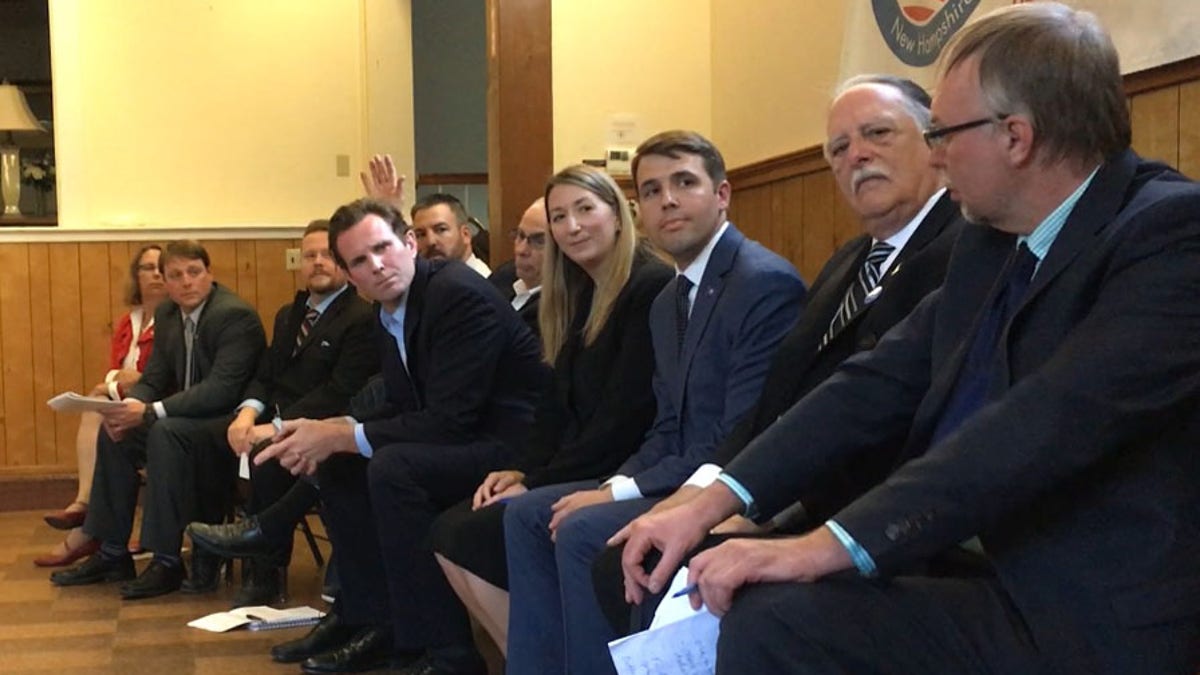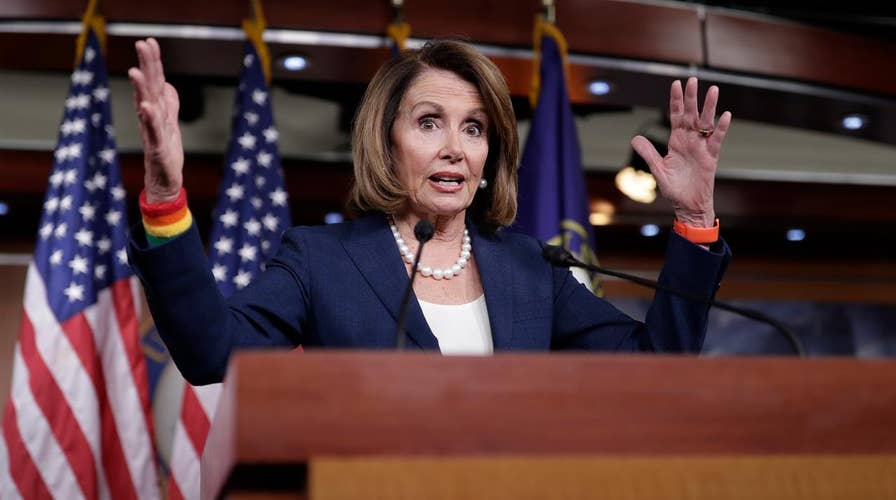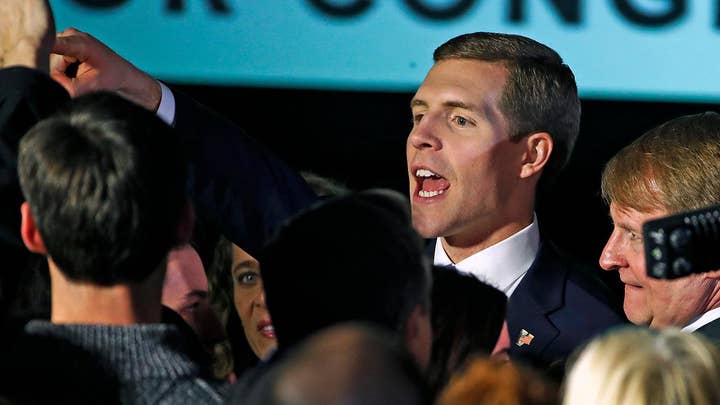Nancy Pelosi doesn’t understand economics: Trish Regan
FBN’s Trish Regan discusses how Senate Minority Leader Nancy Pelosi (D-Calif.) downplayed the strength of the U.S. economy.
HAMPTON, N.H. – Anyone looking for signs that Nancy Pelosi has lost clout within the Democratic ranks this cycle need only catch a glimpse of last week’s candidate forum in New Hampshire’s 1st Congressional District.
When 10 Democratic candidates were asked if they’d support the House minority leader for speaker if elected and the Democrats regain the chamber’s majority, only one raised his hand. Their hesitation speaks to a growing uneasiness among this year’s midterm candidates – especially in swing districts – with the veteran California Democrat’s grip on power.
In New Hampshire, the candidates’ response on the Pelosi question was telling given the nature of the electorate. The seat in play, currently held by retiring Democratic Rep. Carol Shea-Porter, represents a swing district in a swing state.
Perceived Pelosi ties could hurt the Democrats’ bid to hold the seat in the fall. In Pennsylvania, Democrat Conor Lamb surely made similar calculations earlier this year when he vowed not to support Pelosi for speaker – and went on to win a special election in a deep-red district that President Trump carried in 2016 by 20 percentage points.
With his defiance, Lamb started a trend – seen in the New Hampshire forum and races across the country.
Since then, some 20 Democratic congressional challengers in districts controlled by Republicans have publicly distanced themselves from Pelosi.
Among them are Clarke Tucker, the Democratic nominee in Arkansas’s 2nd District who declared in a TV commercial that “I’ve said from day one that I won’t vote for Nancy Pelosi.”
Dan McCready, the Democratic nominee in North Carolina’s 9th District, said earlier this spring, “It’s time for a change and that starts at the top.”
And Dan Kohl, the Democratic challenger in Wisconsin’s 6th District, told Fox6 in April that "if I'm elected to Congress, I would not vote for Nancy Pelosi as leader of the Democrats."
Whether the rank-and-file rejection might actually imperil Pelosi’s bid for the gavel – if Democrats take the House – remains to be seen. But the statements reflect a growing midterm strategy of Democratic candidates distancing themselves from the longtime liberal leader. This, as President Trump and fellow Republicans try to cast Pelosi – along with far-left colleagues like Californian Maxine Waters, who stirred controversy over the weekend with her call to harass Trump Cabinet officials – as the 2018 “face” of the party.
Pelosi, 78, has led the House Democrats for 15 years and after her party won back control of the chamber in 2006, she made history as the first female speaker. The San Francisco politician lost the speakership after the 2010 election, when the GOP took back the House.
Two years ago, she was challenged for House Democratic leader by Rep. Tim Ryan of Ohio, one of a number of younger lawmakers pushing for fresh leadership. But Pelosi defeated Ryan by a more than two-to-one margin.
In early May, Pelosi put to rest any doubts she would run for speaker again if the Democrats flip the 24 GOP House seats needed to retake the majority, telling the Boston Globe "we will win. I will run for speaker. I feel confident about it. And my members do, too.”

Only one of 10 candidates at last week's New Hampshire District 1 forum raised his hand to indicate support for Nancy Pelosi as speaker. (Paul Steinhauser)
Asked about her chances to regain the speakership, Pelosi recently told Rolling Stone, "I don't mean to sound arrogant, but I am confident."
Further, Pelosi has suggested she’s not bothered at all by Democratic candidates distancing themselves from her – assuming a whatever-it-takes-to-win attitude.
"It doesn't bother me," she told Rolling Stone. "I just want them to win.”
Spokesman Drew Hammill stressed that Pelosi enjoys support among sitting Democratic lawmakers: “Leader Pelosi has always enjoyed the overwhelming support of House Democrats and that will continue into the majority she’s so focused on winning. Democrats don’t let Republicans choose our leaders.”
Pelosi’s ambition to reclaim the gavel has excited Republicans. Their playbook over the years has been to attack her and tie Democratic candidates to her. This year, the party has targeted her for her opposition to the Republican tax bill signed into law by Trump in December. Trump, in February, described Pelosi as a “secret weapon” for Republicans as they try to hold onto the House.
The Congressional Leadership Fund, a major outside group that aims to keep the GOP’s House majority, has vowed to spend big bucks targeting Pelosi.
“Nancy Pelosi is by far the most toxic politician in the country, and we continue to see her toxicity increase. CLF will spend millions of dollars reminding voters just how bad Nancy Pelosi is for the country,” CLF Communications Director Courtney Alexander said.
Pelosi remains a fundraising force for her party. She raised an eye-popping $16.1 million the first three months of this year, with the vast majority of cash headed to the Democratic Congressional Campaign Committee. The DCCC is reserving millions in TV ad time for candidates, even those who are not supporting Pelosi.
Rep. Ben Ray Lujan, the DCCC chairman, recently told Politico that he “trusts our candidates” when it comes to supporting Pelosi.
Ryan, who challenged Pelosi in 2016, told Fox News: “I actually think those who make the decision not to support Pelosi, that it’s an opportunity to look independent, to look detached from the partisanship that’s got us locked in where we are today.”
“They can look like a new kind of Democrat, an independent-minded Democrat. And I think that has its benefits in projecting that kind of independent streak,” the Ohio congressman added.
But the National Republican Congressional Committee has a very different take.
“It’s a pathetic attempt to distance themselves from the embattled minority leader,” NRCC national press secretary Jesse Hunt told Fox News. “Voters will find it very disingenuous in the fall when candidates try to utter these sorts of claims when they welcome her financial support and support the same polices that Pelosi supports.”
Meanwhile, while Pelosi faces friction with Democrats seeking support from moderates, she also is grappling with elements of the party who want her to push further left.
Her lack of an endorsement for a sweeping “Medicare for All” health care plan has angered progressives, as has her pushback against talk by Democratic firebrands of impeaching Trump.
“She has done an okay job for her tenure, but I think it’s time to get people who want Medicare for All,” Democratic candidate Mindi Messmer, running in New Hampshire’s 1st District, told Fox News. “It’s time to have some new leadership, in my opinion.”





